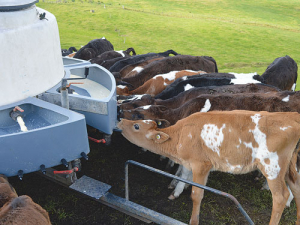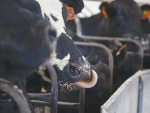Heifers that reach target weights make successful milking cows, and growing them well starts from the day they are born.
All calves, including bobbies, must receive adequate fresh colostrum within the first 24 hours of life and should be fed colostrum, or a colostrum substitute, for at least the first four days of life.
Always handle calves gently and with care. Do not allow anyone to throw, hit or drag a calf at any time. Electric prodders must not be used on calves.
Calves separated from their mothers must be sheltered warm and dry.
Calf pens must be fit for purpose and well maintained. Bedding areas must be comfortable, clean and dry, with adequate ventilation, but draft-free at the calf level. Exposed concrete, bare earth and mud are not acceptable.
Calves should be fed at the same times each day to minimise stress; always ensure your calves have access to plenty of fresh water. Feed calves adequate quantities of good quality feed to rapidly achieve weaning weight with a well-developed rumen.
Colostrum plays a big role in the lives of new-born calves.
The calf should drink at least two litres of fresh colostrum during the first six hours of life to get protective antibodies; pick up calves twice a day and give them gold colostrum
Gold colostrum is valuable even if it has blood or comes in clotty mastitis milk. It is best fed fresh but may be frozen for up to six months. Thaw/heat it in warm water; do not microwave it.
Test the level of antibodies in a batch of colostrum using a Brix refractometer, available from the vet, farm supply store or a homebrew shop; brix higher than 22% is best for newborns.
Store colostrum in several drums (to reduce risk of loss) in a cool place and out of direct sunlight. Stir twice a day.
A colostrum keeper or yoghurt starter, available from supermarkets, can be added to each drum to preserve it. Alternatively, preserve colostrum with potassium sorbate.
Ensure good routine hygiene and health practices:
Scrub all feeding equipment well with hot water and detergent
Remove sick calves promptly to a designated sick pen
Frequently clean and disinfect pens where sick calves are treated
Disinfect hard surfaces
Ensure bedding is regularly refreshed
Control the spread of disease by minimising movement between pens. Calves of the same age should stay in the same pen. However, small or unthrifty calves may be better off with a healthy younger group.
Vaccinate, treat for parasites and provide access to shelter.
Health check
Check regularly to ensure:
- Noses are clear of discharge, moist and cool
- Calves are alert and have responsive ears with no infection around the ear tag
- Navels are clear of infection
- Mouths are clear of ulcers
- Calves can stand and walk normally i.e. no joint ill
- All calves are feeding
- Calves have shiny, supple coats.
- If you lightly pinch a calf’s skin and it is slow to return to normal it may be dehydrated and need electrolytes immediately.


















